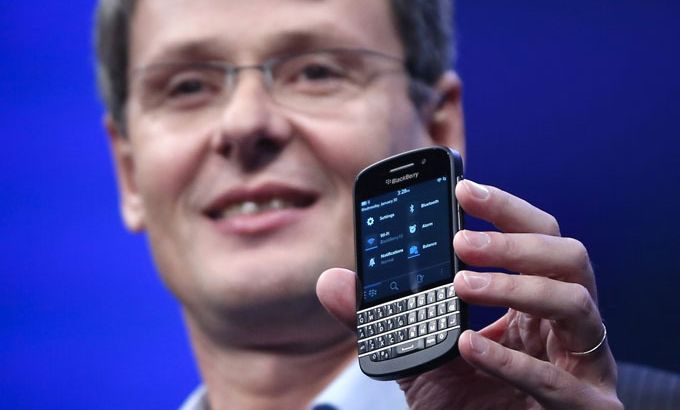Blackberry to slash global workforce by 4,500
Shares in Canadian smartphone maker plummet as it reveals losses of about $1bn and substantial cuts to employee numbers.

Blackberry has said it will cut 4,500 jobs as the struggling Canadian smartphone maker retrenches in the face of hefty losses and weak sales of its new handsets.
The once high-flying international market leader said on Friday it expected to report a net operating loss next week of $950m to $995m in the quarter ended August 31 because of writedowns and other factors.
Keep reading
list of 4 itemsWhy is Germany maintaining economic ties with China?
Behind India’s Manipur conflict: A tale of drugs, armed groups and politics
China’s economy beats expectations, growing 5.3 percent in first quarter
The company, which has struggled to claw back market share from the likes of Apple’s iPhone and Samsung’s Galaxy phones, said it would cut more than a third of its global workforce, rekindling fears of the company’s demise and sending its shares into a tailspin.
The results will put more pressure on Blackberry, owned by Research in Motion, to find a buyer for either some parts of the company, or for all of it.
It said last month it is weighing its options, including an outright sale, in the face of persistently lackluster sales of
its new smartphones, which run on the Blackberry 10 operating system.
BGC Partners analyst Colin Gillis said the company had sailed off a cliff.
“What do you expect when you announce you’re up for sale? Who wants to commit to a platform that could possibly be shut down?” Gillis said.
Blackberry’s Toronto-listed shares fell as low as 23.7 percent to C$8.25 on Friday, their lowest this year, before closing down 16 percent at C$9.08.
The company’s Nasdaq-listed shares ended 17 percent lower at $8.73, after falling as low as $8.01.
At the height of its success in 2009, Blackberry enjoyed global market share of more than 20 percent, according to Mike Walkley, an analyst with Canaccord Genuity.
It was so addictive it inspired the nickname “CrackBerry”, US President Barack Obama confessed to being among the millions of devotees who could not bear to stop tapping feverishly away on its tiny keyboard, and Madonna once said she slept with one under her pillow.
But then came the iPhone, Samsung and other sophisticated smartphones, and users newly addicted to social networks changed allegiance. Blackberry now has a market share of just 1.5 percent.